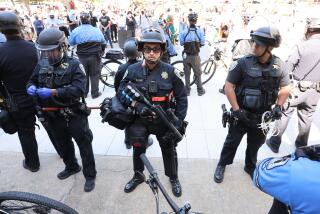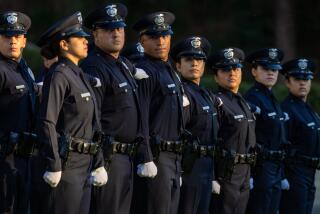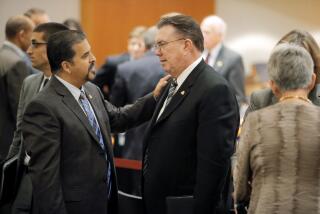Muslims, Police Hold Peace Talks to Ease Hostilities
- Share via
Los Angeles police officials and representatives of the Nation of Islam met Monday and agreed to a continuing dialogue designed to ease tension between the two sides.
The two-hour meeting, called historic by some participants, grew indirectly from a violent clash earlier this month between Muslims and police officers.
The session resulted in an agreement to begin what one police official described as a “cross-training” program to lessen misconceptions officers might have of the Nation of Islam and misperceptions Muslims might have of officers.
In addition, police officials agreed to change some of departmental procedures to prevent clashes between officers and Muslim street vendors, which have increased in recent months.
The meeting was held on neutral ground in the offices of the Brotherhood Crusade, an activist group.
Nearly a dozen police officials were on hand, including Deputy Chief William Rathburn, head of the department’s South Bureau, and representatives of six police divisions that have a significant black population.
Half a dozen Muslims attended, including Wazir Muhammad, head of the Nation of Islam’s Los Angeles mosque, and Wali Muhammad, who is in charge of the Western branch of the Fruit of Islam, the Nation of Islam’s security force.
“I’ve been with the nation for 32 years, and I know of no other time when Muslims and police have sat down and talked on this level,” Wali Muhammad said afterward.
The gathering, he said, would do much to improve relations between police and “not only Muslims, but the black community in general.”
Rathburn said he has come to believe that the Nation of Islam and the Police Department share many goals, such as ending gang violence. Monday’s meeting, he said, is “the beginning of a continuing dialogue that is long overdue.”
The gathering differed significantly from two earlier meetings Rathburn held with Wazir Muhammad and other Muslims after the Jan. 3 clash between 13 Muslims and two dozen officers, he said.
The incident, which occurred in the parking lot of a convenience store on Crenshaw Boulevard, began with what police say was a routine traffic stop and ended with three Muslims and four officers hurt.
Various charges are pending against all 13 Muslims.
Meanwhile, the Police Department has launched an internal investigation of allegations that the officers instigated the violence, then lied about how it came about.
The Nation of Islam is also conducting an investigation. Officials of the group contend they have witnesses who will attest to seeing officers beating the 11 adult Muslims and two teen-agers as they lay handcuffed on the ground.
Earlier meetings involved a much smaller number of people and were marked by some distrust and a lot of misconceptions on both sides, Rathburn said. Those sessions focused solely on the clash, he said.
“I wish we had a videotape of the first meeting,” Rathburn said. “They were very chilly towards us and mistrustful, and I guess they saw us the same way.”
By contrast, both he and Wazir Muhammad agreed, Monday’s meeting was friendly and productive.
Muslims provided police with copies of the rules they tell their members to follow when stopped by officers, complete with Penal Code citations. Police provided an information packet to the Muslims that included copies of state and local street vendor codes.
Rathburn said the vendor issue was potentially explosive and that it had led him to seek, unsuccessfully, a meeting with the Nation of Islam leadership weeks ago.
In one recent incident, a Muslim and a traffic officer got into a fight after, police contend, the officer confronted the man after he stepped into traffic while trying to sell a bean pie.
Muslim men are put to work selling Muslim-made bean pies on street corners if they have no other means of livelihood, officials of the group say.
Rathburn said problems arise if the men have no vendor’s license or if they step into traffic to sell their goods.
Under the new procedures, he said, traffic and patrol officers will ignore the vendors unless they receive citizen complaints. Such complaints will be turned over to a police supervisor for further action.
More to Read
Sign up for Essential California
The most important California stories and recommendations in your inbox every morning.
You may occasionally receive promotional content from the Los Angeles Times.













